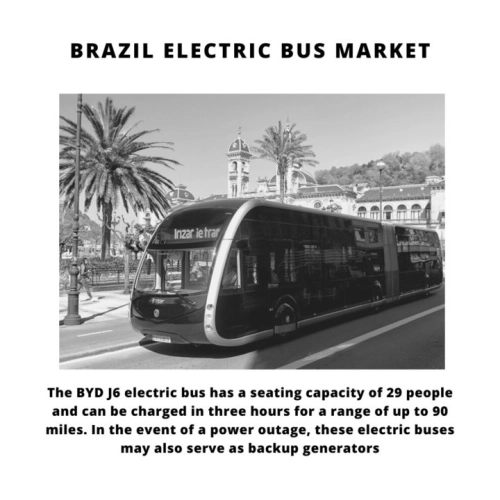
- Get in Touch with Us

Last Updated: Apr 25, 2025 | Study Period: 2023-2030
In Latin American cities, public transit is quite important. Because of their large population densities, cities are also the most likely places to be the most polluted. Electric buses offer a unique potential to provide a comfortable means of urban transit while also improving air quality and reducing traffic congestion.

To encourage the adoption of electric buses, new contractual procedures have been developed. Bus companies will be compensated based on the number of passengers transported rather than the number of miles travelled under the new contracts. In addition, servicing contracts are issued independently of bus procurement.
| S No | Overview of Development | Development Detailing | Region of Development | Possible Future Outcomes |
| 1 | Mercedes-Benz launches an electric bus chassis in Brazil | The Mercedes-Benz has introduced the world's first electric bus chassis, which was designed specifically for the Brazilian market. EO500U is the name of the device. | Brazil | This would enhance better Technological Controls |
| 2 | ZEBRA partnership to accelerate electric bus deployment in Latin America | In Brazil, Chile, Colombia, and Mexico, (ZEBRA) plans to deploy almost 3,000 new electric buses. | Brazil | This would enhance better Technological Controls |
| 3 | Chinese clean energy company contributes to Brazil's sustainable development | In Brazil, the trend for renewable energy generation and consumption is moving in the right direction toward a more sustainable future. | Brazil | This would enhance better Technological Controls |
| 4 | BYD presents first electric bendy bus made in Brazil | It's a strategy BYD has introduced the country's first electric articulated bus. | Brazil | This would enhance better Technological Controls |
Brazil, which has the world's second largest bus fleet and roughly 4,800 licensed electric vehicles, is a prospective market. In Brazil, the corporation is attempting to promote electric mobility in the country's major cities.
Numerous companies are collaborating with huge assembly companies to give Brazil an integrated experience, with its primary initiatives comprising electric buses and charging stations.
The corporation aims to support municipal transportation's energy transition and sustainable measures in order to ensure a superior quality of life for inhabitants and businesses in smart cities.
Mercedes Benz is a leading mobiliser of the various explorer oriented electric vehicle manufacturer requirements in the market. The eCitaro is a finished developing all-electric bus, not a prototype.
Citaro, a well-known brand, ensures its exceptional quality. To this, add manufacture of the conventionally powered Citaro at the Mannheim bus plant. The drive axle and electrohydraulic steering, for example, have already proven their usefulness in the rigours of city bus operation.
BYD is a leading mobiliser of the various explorer oriented electric vehicle manufacturer requirements in the market. The BYD J6 electric bus has a seating capacity of 29 people and can be charged in three hours for a range of up to 90 miles.
In the event of a power outage, these electric buses may also serve as backup generators. On Kyoto's famous sightseeing bus line, Keihan Bus and Kansai Electric Power plan to execute a five-year trial operation with the first batch of four BYD J6 buses.
| Sl no | Topic |
| 1 | Market Segmentation |
| 2 | Scope of the report |
| 3 | Abbreviations |
| 4 | Research Methodology |
| 5 | Executive Summary |
| 6 | Introduction |
| 7 | Insights from Industry stakeholders |
| 8 | Cost breakdown of Product by sub-components and average profit margin |
| 9 | Disruptive innovation in the Industry |
| 10 | Technology trends in the Industry |
| 11 | Consumer trends in the industry |
| 12 | Recent Production Milestones |
| 13 | Component Manufacturing in US, EU and China |
| 14 | COVID-19 impact on overall market |
| 15 | COVID-19 impact on Production of components |
| 16 | COVID-19 impact on Point of sale |
| 17 | Market Segmentation, Dynamics and Forecast by Geography, 2023-2030 |
| 18 | Market Segmentation, Dynamics and Forecast by Product Type, 2023-2030 |
| 19 | Market Segmentation, Dynamics and Forecast by Application, 2023-2030 |
| 20 | Market Segmentation, Dynamics and Forecast by End use, 2023-2030 |
| 21 | Product installation rate by OEM, 2023 |
| 22 | Incline/Decline in Average B-2-B selling price in past 5 years |
| 23 | Competition from substitute products |
| 24 | Gross margin and average profitability of suppliers |
| 25 | New product development in past 12 months |
| 26 | M&A in past 12 months |
| 27 | Growth strategy of leading players |
| 28 | Market share of vendors, 2023 |
| 29 | Company Profiles |
| 30 | Unmet needs and opportunity for new suppliers |
| 31 | Conclusion |
| 32 | Appendix |